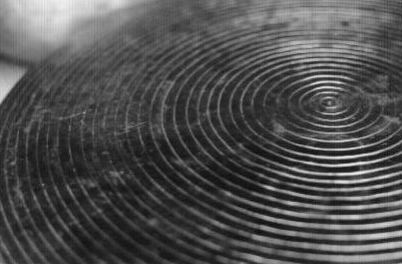
I'm becoming interested in note based music again - really since Marcos played some Sciarrino for me the other day. Of course, the more I think about notes, and interact with notes, the old problems seep back to irk me.
For instance, the other day we saw the LU Symphony play a Dutilleux violin sonata - I don't remember what it was called, but it was great. Maybe great then especially because it followed the heavy and gross lines of the William Tell Overture (or "the Lone Ranger" as Paul overheard an older gentleman describe it) - so Dutilleux's traditionalism didn't bug me, all I heard were the quiet spectral moments when cymbol rushes blended darkly into a mass of velvet cello.
Anyway, afterward, Jen was telling us about one of her favorite parts, and referred to the "high E" to orient us to the spot she was describing. She was just using the language that was most comfortable for her - a practical language that comes from working daily with scores. Nevermind that none of us (Bryan, Paul, or I) had actually seen the score for the piece, had perfect pitch, or in Paul's case (since he knew the piece) had sat down to transcribe it -- nevermind all that. What irked me at that moment was the way that note name was being used - it was being used exactly, to decribe a sound, to stand in for a sound. Words don't stand for sounds - or, what I mean is, words don't stand for sounds in any exact way. In fact, I'd say the only attraction in using words to stand for sounds is that they'll always be imperfect stand-ins. It's that loss in translation that's fun, where the magic happens. So I was irked, coming from a performance of a piece that seemed to me to shine for its skill at stepping away from the shackles of notes (into the world of sounds, spectrum, color, fluidity, etc) only to be described with this audiovisual term that conjures a dead black spot on a stark white page. Ugh.
It reminded me of the danger in scores - for them to devour the sounds they should be enabling. And it reminded me why on Friday I found Sam Adler's music to be as dead as those dots on the page - except for his piano piece, and I'm convinced it had something to with the fact that he was forced to use non-standard notation to realize the inside-piano bits.
All that aside, I'm excited to use a score, and an acoustic ensemble - it doesn't seem like a waste of time anymore, I see a glimmer of hope again. Thanks Marcos!
 I'm reading Raymond Williams' Country and City in my library office, and I realized that all my life I've thought of myself as a resident of the country. Corn fields, one-room schoolhouses, open land, and other farmer/cowboy identifications are suprisingly natural for me - someone who has lived their entrie life in the city.
I'm reading Raymond Williams' Country and City in my library office, and I realized that all my life I've thought of myself as a resident of the country. Corn fields, one-room schoolhouses, open land, and other farmer/cowboy identifications are suprisingly natural for me - someone who has lived their entrie life in the city. 





